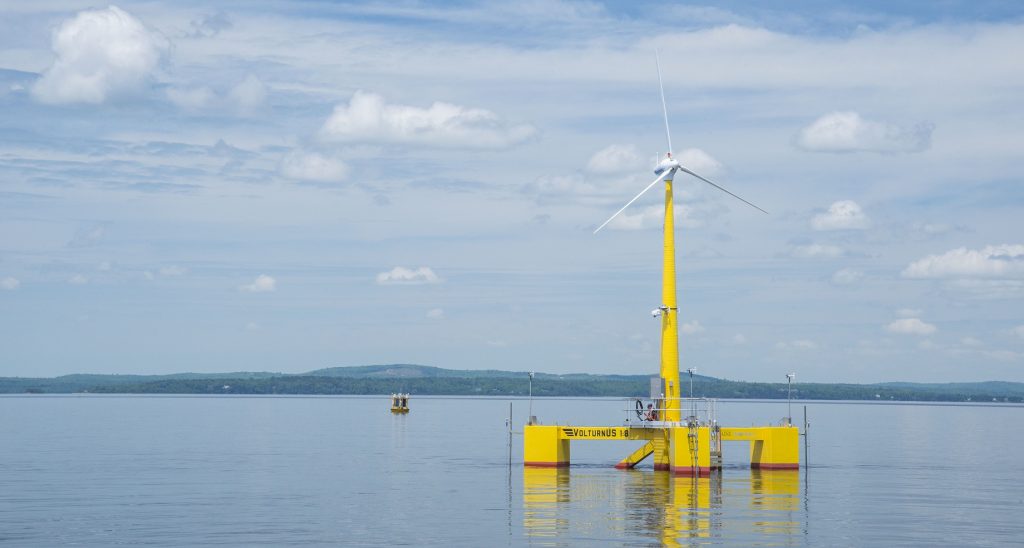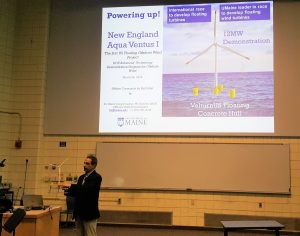Students Broaden Awareness of Floating Offshore Wind Research
By Dalton Bouchles
The Gulf of Maine boasts one of the highest quality offshore wind resources in the United States, with a capacity equivalent to 156 Gigawatts, equal to 156 nuclear power plants. However, 89% of Maine’s offshore wind resource is over deep waters, where it’s too deep to install the traditional bottom-anchored wind turbines. That’s why Maine Aqua Ventus, out of the Advanced Structures and Composites Center (ASCC) at the University of Maine, is developing floating offshore wind technologies that will make deep-water offshore wind power possible. Maine Aqua Ventus is currently leading a demonstration project called New England Aqua Ventus I, a 12 megawatt floating offshore wind pilot project. This project demonstrates the innovative design of the VolturnUS, a floating semisubmersible concrete hull. It also shows how offshore wind will generate local economic benefits, create and keep Maine jobs in Maine, and provide renewable energy now and in the future.

To increase Maine Aqua Ventus’s outreach and engagement, a group of students from ECO 381, Sustainability, Action, and Policy, reached out to Meghan Collins, the Communications Manager at the ASCC. This course is service-learning focused, meaning that a large amount of the learning associated with the class is done by the students completing community service at UMaine or in surrounding towns. Students work with an organization to help them solve a problem, such as increasing outreach or developing a plan to improve the local community.
After meeting with Collins, the ECO 381 team developed ideas for outreach campaigns that would connect Maine Aqua Ventus to local community members. The students came up with a list of possible outreach strategies, including: planning a presentation about the offshore wind project during Earth Week, designing posters for the presentation, creating a blog, reaching out to the local news stations, and developing a social media post for all sustainability-focused organizations on campus to share. After considering the potential ideas, they came up with a game plan. During Earth Week on April 24th, Dr, Habib Dagher, Executive Director, of the ASCC, presented on the New England Aqua Ventus I project. To advertise the event, the students designed posters sharing quick facts about Maine Aqua Ventus. These were hung around the Union and various departments. One of the team members reached out to a local news station to share a story about the presentation. The students also reached out to all sustainability-focused organizations on campus, such as Green Team, Sustainability and Environmental Action Division, and the Office of Sustainability, to share posts on their social media about Maine Aqua Ventus and the Earth Week presentation.

The ECO 381 outreach project is a win-win for Maine Aqua Ventus and the student volunteers. While Maine Aqua Ventus received tremendous help in sharing the story of Maine offshore wind development, the students gained useful skills in teamwork, marketing, coordination, and much more.
“Working together with Maine Aqua Ventus to promote sustainability and renewable energy has been a very interesting project. The significance of their work will impact Maine’s future on so many levels, which is why it is so important that the local community is aware of their work. Our work is valuable to educate more people and we hope that this will contribute to a greater environmental awareness for the local community.”
– Emilie Andersen, Class of 2020, Economics Undergraduate Student
The students hope that the momentum they’ve created for Maine Aqua Ventus will continue, expanding outreach not just to Bangor area communities, but to other states, universities, and companies that are interested in the development of deep-water offshore wind power. For Timothy Waring, professor of ECO 381, service learning is an opportunity for students to work with “concrete problems, faced by real people considering concrete solutions”.
“By allowing students to become, for a semester, professional consultants to stakeholders in the local community, service learning accomplishes what most classroom education cannot. At the end of the semester, not only have the students contributed to local solutions, they have built new professional relationships, and have gained lasting experience in solving real-world problems. This is what true education is all about.”
– Timothy Waring, Associate Professor of Social-Ecological Systems Modelling
